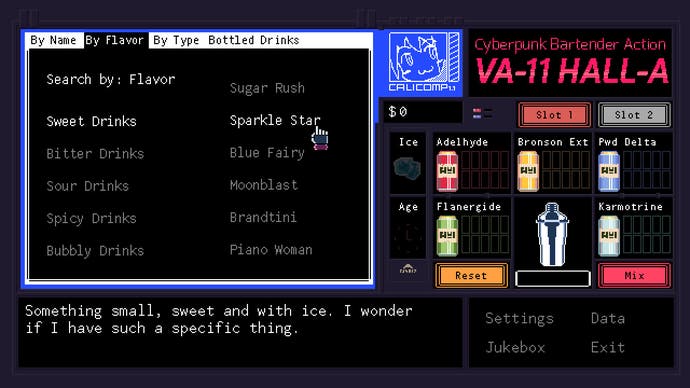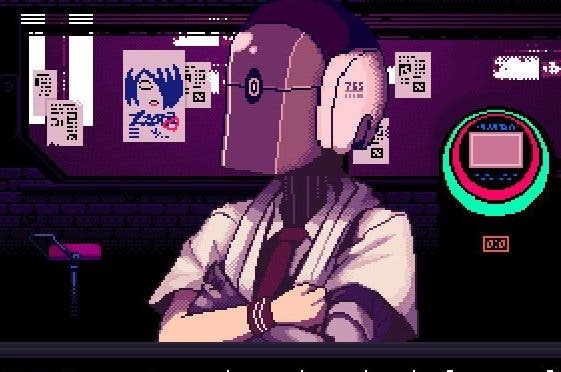Does VA-11 HALL-A capture the joy of a menial job well done?
I'm viking it.
Exploring tombs, flying spaceships, working as a magical pest-control man with cool eyes - these are all things we're unlikely to do in our lifetime. But some games don't deal with lofty fantasies. Instead, they let us experience a more down-to-earth fantasy of working in a vocation that we simply can't be arsed to learn for real.
VA-11 HALL-A - or Valhalla, which is less of a mouthful - is a PC game that trades in this kind of fantasy. It belongs to the same category as Papers, Please, Harvest Moon and Euro Truck Simulator, but, rather than navigating bureaucracy, agriculture or trucking, Valhalla focuses on the art of bartending - something that can be exciting, but often isn't.
I used to work in a bar. Not the kind that you find in London, where the entrance is hidden inside a biscuit tin and you have to give a password to a pig before you're allowed in, or where the drinks are expensive, on fire and topped with a caramelised duck foetus. Mine was the kind of bar that should really be called a pub. You usually find these kinds of bar nestled somewhere between the only Post Office for 40 miles and a grotty newsagents.
Valhalla is not that kind of bar. Perhaps I should be glad of this, because the smell of stale Guinness gives me horrible flashbacks. It's not the fancy kind of London bar, either. Valhalla instead takes place in a dystopian cyberpunk society, where the art of mixology is reduced to the manipulation of just five canned ingredients: Adelhyde, Bronson Extract, Powdered Delta, Flanerglide and Karmotrine. Making drinks (as the hopelessly romantic, slightly bewildered bartender, Jill) is done by choosing one of 24 recipes, dragging each ingredient into a cocktail mixer, then adding ice or aging or doubling the ingredients to make a large drink, each action done with a single click-and-pull motion, over and over again. It's functional, but dull, and the tedium of handling each ingredient starts to grate quite quickly.
There is a set menu of 24 drinks to choose from, and you combine the five liquids to create something that ticks all of the customer's boxes. There's not much of a challenge in mixing the drinks, as you can start over without any penalty and there's no time limit, and yet the game tells us that the bartending is your only real influence on what's happening. All the dialogue is as canned as the drink ingredients - including your own. It's just too easy to get it right, even when Jill is "distracted" and forgets orders.
Cocktail-making exists somewhere between alchemy and legerdemain, but here it's something that involves tipping differing amounts of five similar-looking cans into a mixer. When I was a student, there was a lot of that kind of bartending - two parts WKD, three parts Red Bull, eight parts bittersweet, aching nihilism. In Valhalla, it's a similar hint at the society on the other side of the bar - like students, the people of this broken, terrifying culture want to drink, now, and they don't much care how it tastes beyond a handful of adjectives - "sweet", "bitter", "bubbly". Why complicate it?
However, if Valhalla's aim is to replicate the tedium of bartending, it does it a little too well. Games like Papers, Please and Harvest Moon take pleasure in their slow, quotidian tasks: feed the cows, water the crops, interrogate the terrorist scum, sell the turnips. But there's often some extra layer to them. In Harvest Moon, you can wander the town, make friends and lovers amongst the locals, and in most games you have a hand in improving the daily life of everyone you encounter. In Papers, Please, you can make small but deliberate attempts to support the rebels or your family, which tend to be mutually exclusive decisions.
Valhalla, on the other hand, focuses on mixology as a fairly passive occupation. It is your lot to listen to the woes of the general populace, and to try and make them drinks to counter their ennui. Those tend to be the drinks with alcohol in. There's not much you can do, beyond listening, and this is the point. In this game, you're not the focus. You're not the all-powerful protagonist. You will not save the day, and nor will any of your customers. You're all just average schmos, interacting over brightly coloured beverages, complaining about the government. I guarantee that any bar, wherever you live, will be exactly the same, just without the dubiously underaged sexbots.
But despite the fact that the decision to make the bartending functional and minimalist is probably an intentional one that ties into the game's tone and setting, I still find myself wishing that it was a bit more exciting. What I enjoy about going to bars is that the cocktail maker's personality comes through in the act and the outcome - the drink is a small part of its creator - like a horcrux, but tasty. But when Valhalla promises the idea that my choice of drinks has some effect on the story, then why can't I have a greater influence over the recipes and style of what I'm serving?

With games that introduce us to vocational work, there's usually a sense of control. Ace Attorney lets us feel as if justice is our doing, even though the story is on rails. Cooking Mama makes us follow recipes, but rewards us with gamified goals and medals. Euro Truck Simulator gives you control over the radio, which seems like a small thing, but it's not.
Valhalla's bartending is just boring. There's just not enough player control to make any functional difference, making the illusion of choice meaningless. Boredom without creativity is merely boredom and nothing more.
It truly is an interesting idea - having a small, trivial but intimate impact on a world going to hell in a robo-handbasket, told through the incredibly human activity of drowning your sorrows and trying to find solutions at the bottom of a glass. But Valhalla's take on bartending just isn't very interesting to me. Even working a minimum-wage job at a pub had its fun moments, its small glimmers of escapism.
There's a satisfaction in pulling the perfect pint of Guinness: not too much head, nothing spilling over the rim to pool, stickily, on the counter. Being able to memorise the crisp selection or wine list and throwing in a couple of tasting notes like you're a qualified sommelier rather than a student in need of money. Tearing off the tiny packs of peanuts with a satisfying rip. Real-life bartending is tactile and responsive, and that's what humans love most: seeing your actions have some kind of impact on the real world, getting tangible feedback from our existence and actions.
The reason menial job simulators are successful is that they replicate the whole experience: the boring bits alongside the tiny inch of freedom that any sane human will seek out to make it bearable. Valhalla instead made me feel like I was doing a shift in a bar that had run out of most drinks, having to cobble together an approximation of a beer from whatever leftover pints I could find on the deserted tables. Tedium doesn't have to be tedious - in fact, most of the time it can rival the lofty fantasies of spaceships, tombs and wizardry with the power of simplicity and the satisfaction of a menial job well done.

